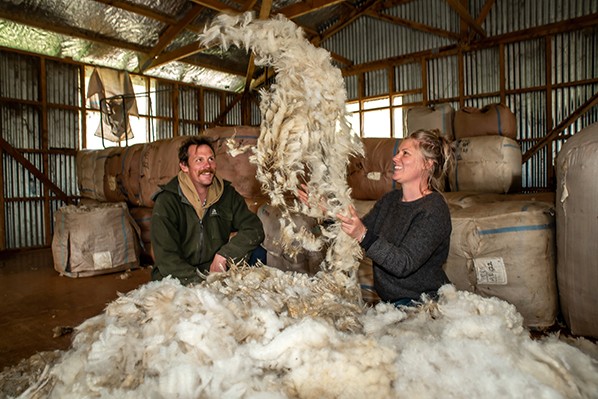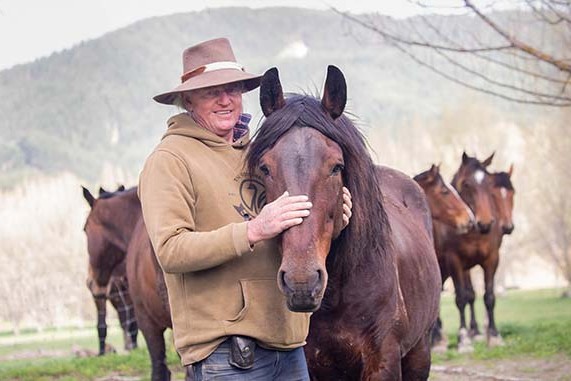Joe Ferraby was at the heart of creating Farmlands nationwide, after starting out as a very junior director on the Marlborough Farmer Producer Co-operative in 1979. He was the PPCS director that headed north into Richmond territory post-takeover. Joanna Grigg talks to Joe about his experiences and his advice for governance of farm businesses.
Joe Ferraby has an impressive directorship and advisory curriculum vitae.
Not just for the sheer length of time (40 years with one agribusiness firm) but for the quality and range of his work. Not that you’d hear about it from Joe. This Marlborough farmer is more likely to ask your opinion than give his, although when requested, his opinion is clear and considered.
From the board room he has overseen the growth of the Marlborough Farmer Producer Co-operative from one store in Blenheim, to become part of the impressive Farmlands chain of stores with 80,000 shareholders. He was the PPCS director who willingly took on the A&P Show circuit in the North Island heartland at the time of the Richmond take-over, in 2005.
“With the local drafter for support I should add.”
He went on to chair the North Island Suppliers Council; the conduit between suppliers and the Silver Fern Farms board and senior management. He survived the Silver Fern Farms director retrenchment and went on to be instrumental in trimming debt and moving to a brand-led business.
“I believe strongly in the new integrated model, linking sheep and beef processing more closely to the market place with the new branding strategy.”
As to the Richmond takeover, this played out badly, he says.
“Both sides could have done better and farmers paid for it.
“The saving grace is that we’ve all moved on, I think, with many vocal former-Richmond farmers I knew since becoming supportive shareholder suppliers; a highlight for me.”
He’s overseen acquisitions of Marlborough vineyards through his role of chairman of Seddon Vineyards of Marlborough and then Terra Vitae (an unlisted public company). As chairman of Marlborough Lines (2002) he was part of growing the business, acquiring 51% of Otago Power which added $9 million to the turnover and put it in a very strong position.
During his years as a director, he has seen foundation rural service businesses merge (think PGG and Wrightson), the meat industry go through dramatic changes in scale and marketing approaches, and the growth of large family or corporate farms and vineyards. He has dipped his toes in property development, finance and tourism business directorships, but his first interest has always been the rural supply and service sector.
Brent Esler, CRT then Farmlands chief executive 2004 to 2015, says Joe’s early vision to merge the small regional rural traders into a combined South Island unit (Combined Rural Traders) was a good one.
“He was an early trail blazer and good at breaking down regional barriers, and achieving economics of scale and strength of scale.
“He knew what was best for the co-operative and, through better buying power and mergers, helped turn it from a $360m turnover business in 2004 to $1.3 billion eight years later.”
In 2015, Farmlands’ national turnover was $2.5b.
“Joe was chair from 1999 and merged Marlborough/Nelson with West Coast and Canterbury, and stepped aside as chair to facilitate the merger between Canterbury, Southland and Otago into the group. This was selfless behaviour, doing what’s best for the co-op.”
Esler says understanding staff and shareholder needs was a strength of Joe’s during his tenure.
Perhaps living in Marlborough, removed from deep-south parochialism and slightly-closer to the North Island, has meant Joe can deal with all regions with a degree of independence. Through it all, Joe is certainly older and wiser, and perhaps thicker-skinned, but has retained his sheer enjoyment in working within business.
“I have been privileged to work with some inspirational CEOs and sat around board tables with some outstanding chairman and directors, who are so wise in good times and bad.”
Beyond the farm gate
Joe admits he was always interested in business beyond the farm gate; the business streak inherited perhaps from his great-grandfather who had an import/export business in Hull, England. His father had gone shepherding in the North Island as part of his tour to the colonies, meeting his future Marlborough wife on returning to England. Joe was bought up on his parents’ newly purchased block of land, Barewood, south of the Awatere River.
“I worked on headers each summer holiday and loved farming, so was happy to step straight in after school, with my brother who was a silent partner in the farm.”
The Ferraby brothers were realistic about the ability of a 650-hectare, 2000 stock unit farm to support them both. Succession discussions were well underway by their teens and, by 21, Joe took a large mortgage and went farming outright. The aspect he is most proud of with his farming career was lifting stock units to 3500 through farm development (fencing, fertiliser) and buying two more blocks of land.
“This experience has helped a lot when working on boards for other agribusinesses looking at development.”
Joe did not have a formal training beginning to his director career.
“I started out on the school committee and in Young Farmers as a young man, and I always attended PPCS and other farmer meetings.
“I was the one that would always read the annual report and ask the questions.”
He credits Young Farmers with good training in running a formal meeting. Jack Dawkins, then chair of the Marlborough Farm Trading Society, recognised Joe’s interest and asked him to come on the board in 1979.
“I was the only young boy at the table and I learnt on the job.”
At this stage, it was just a ‘card’ that gave discounts, no store.
“I soon realised that farmers buy retail and sell wholesale, which I wanted to help break.”
Scale had to improve so, together with Nelson chair Bill Rowling, Marlborough and Nelson were merged, with Joe as chair.
“I had to quickly learn about the technology of running a billing system, so I asked my eftpos contact to help, and Farmlands still uses this system.”
Bruce Hancock (ex Brierley’s) became a mentor, as well as Ian Farrant, whom he first met through the PPCS board.
In 1983 Joe stood for the PPCS board, missing out, but won the vote in 1988, starting a 22-year run with the co-op.
“I wanted to know what happened to my lambs once I sold them and how it all worked.”
By this time Joe was on six boards and had employed a manager on the farm. Eventually he realised leasing was the best option and Richmond Brook, the farmer next door, took on the lease for 10 years. Barewood is now on the market, something Joe describes as best to do “while we can still make decisions and before we get too much older”.
Over his career he has completed directorship courses and became a chartered fellow of the Institute of Directors in 2017. It is the Kellogg Rural Leadership Course (1999) that he really rates as a help for development of his skills and building contacts.
“We had a great year group and I still keep in close contact with many of them.”
When it comes to people, Ferraby says being a good director is as much about finding the right people for advice about a project as knowing how to do it yourself. This is why contacts within different industries (lawyers, accountants, planners, politicians) are so useful.
“If I feel we can’t make the best decision within the board, I’ll get help.”
He advocates consensus, rather than taking a vote.
“My strategy with dealing with initial confrontation is let it run, then quietly respond, and to distance yourself emotionally.
“Don’t hold a grudge is my advice.”
Many farmers are not meeting-type people. They owe a debt of gratitude to those prepared to drive the distance, read the papers and put in the time on council committees, co-operatives, industry promoter groups and in agribusiness governance.
“I was asked to go into politics, but that’s not for me.”
During his spare moments he has helped his wife Carol build an internationally-recognised garden at Barewood. Joe is very diplomatic about the time demands of this but admits he doesn’t share quite the same passion for gardening as Carol.
Advice from the Elder Statesman
Joe Ferraby acquired the nickname the Elder Statesman on the 1999 Kellogg Rural Leadership Course. Without trying, Joe just seems to be the type of person to give good advice; knowing what to do next in a tricky business situation in a calm and collected manner.
Now, with 40-plus years involved with farm businesses, including his own, he says forward planning is key to success or, at the least avoiding major hiccups.
“Farm succession discussions should start to happen when families are teenagers; preferably before there are wives, husbands and partners.
“This way children learn what options are there and start to form realistic views.”
He is grateful to his parents for doing this. He suggests an outsider be employed to help set the agenda, and chair farm meetings. He acts as an adviser for several family farm businesses (both as a non-paid friend and paid director) with his largest family group running seven sheep and beef farms.
He sees a place for advisory boards, especially for medium to large farms, as this doesn’t require a highly paid board of directors. Rather it is a small team that meet with the farm owner and advise rather than have any legal power. They help set long-term plans and give management advice to the owner.
“The chair is usually independent from the farm and members may be the owners plus a farm adviser.”
His number one tip for meetings is be informed. Do your research. In a potentially confrontational situation, bring up the elephant in the room.
“Talk first so you get to lead the way through a tricky topic, then hear other views.
“Be prepared to moderate your views based on good arguments.”
He sees the role of the chair as the person getting a decision from the group.
“Push for it.
“Manage it for the best result; not necessarily your result.”
Joe says he loves working with family farms and counts the families as friends.
“Decisions are often made quickly by these people, which I like, as it often gives the first mover an advantage.”
As to importing and exporting, he likes the way it broadens one’s horizon, outside New Zealand.
He sees dangers in using too much outside consultancy advice and directors losing touch with shareholders. He doesn’t have an issue with bigger boards for co-operatives.
“It gives better contact between shareholders and directors, remembering that the shareholders are clients as well.”
Some mergers in agribusiness have been tough.
“We (Farmlands) gained $70m of business when PGG Wrightson merged, such was the allegiance to one firm or the other in the South Island.”
The topic of the day: Marlborough Lines’ purchase of Yealands, which he supports.
“It’s a good way for Marlborough to invest in Marlborough, keep Yealands out of foreign ownership and it gives a good return to consumers of electricity supplied by Marlborough Lines; plus the purchase price was cheap.”
His message to wannabee directors is to go through the Farmlands/Silver Fern Farms directorship courses, or the Kellogg Rural Leadership Course.
“They offer good practical advice.”




